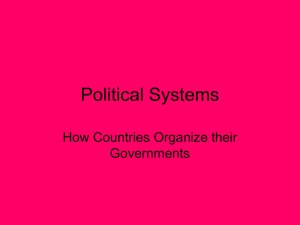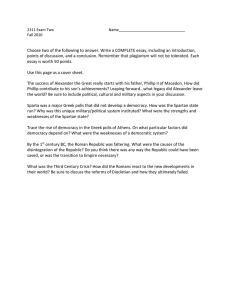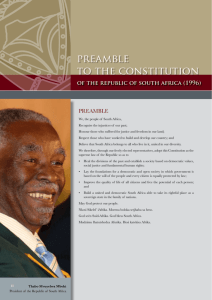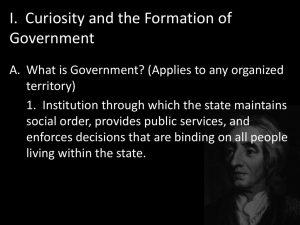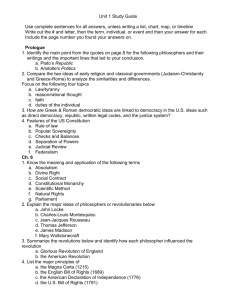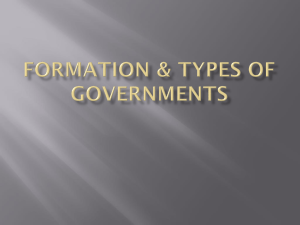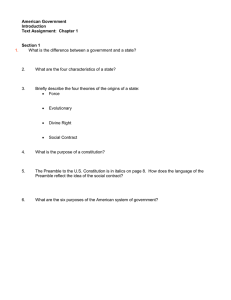Presentation1- Types of Government
advertisement
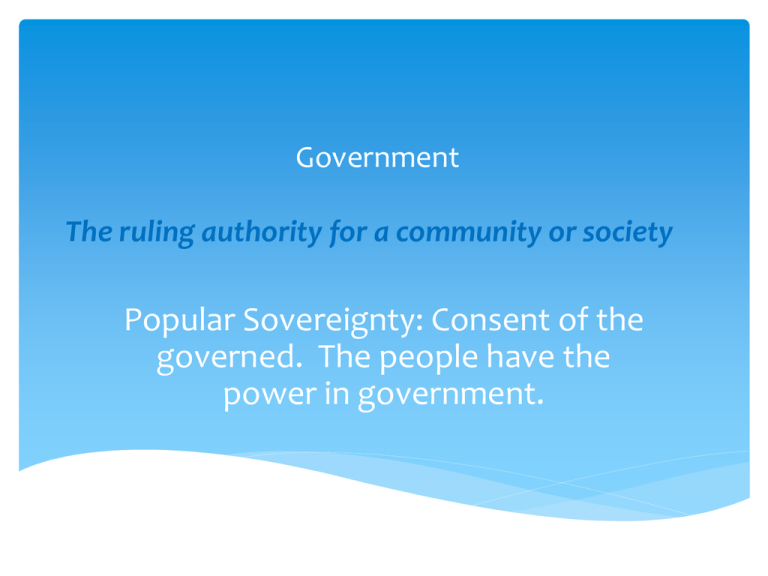
Government The ruling authority for a community or society Popular Sovereignty: Consent of the governed. The people have the power in government. What is the function of government? The Purpose of Government is to do the following: Keep Order To provide laws To help prevent conflicts To help settle conflicts Provide Security To defend citizens against crime& foreign attack Provide Public Services Libraries, schools, hospitals, parks Build & repair streets, bridges, etc. Help the needy Create public policy ( Laws that benefit the public) Budgeting –plan for collecting & spending money Guide the Community There are 3 Levels of Government Federal (National) : make laws (public policy) that benefit the whole country. Washington, DC State : make laws and public policy that benefit the citizens of that state. Raleigh, NC Local city, county (municipality): public policies (laws) that affect citizens of the city or county. Charlotte, NC In the United States we have a democratic form of government. There are different types of democracies. Direct Democracy: everyone has one vote and all votes are equal. Constitutional monarchy: King + law making body usually a parliament + a constitution. Ex: Great Britain, Canada, Denmark, Spain, Jordan. Representative Democracy: People elect representatives to direct the power of the government. America has a representative democracy . A representative democracy is also known as a REPUBLIC. Rome had a republic form of government and our founding fathers understood the benefits and strength that it brings to governance. The Pledge of Allegiance I pledge allegiance to the Flag of the United States of America, and to the Republic for which it stands: one Nation under God, indivisible, With Liberty and Justice for all. You say the word Republic because that is form of government we have in the United States. CHARACTERISTICS OF DEMOCRATIC GOVERNMENTS: 1. Competitive elections 2. Multiple Political Parties 3. Every person’s vote carries the same weight 3. Characteristics of Democratic Governments 4. Majority rule people abide to what most citizens want, but respect the rights of the minority. 5. Secret Ballots: right to privacy 6. Right to express views 7. Legal requirements to vote are kept at a minimum Age Citizenship Residency Principles of American Government * Rule of Law All people, including those who govern are bound by the law Limited Government Government may only do those things that the people have given it the power to do Consent of the Governed American citizens are the source of all governmental power Individual Rights Rights that people are born with, protected by the government Representative Government People elect their leaders to make laws and govern on their behalf Other forms of Governments AUTHORTITARIAN GOVERNMENTS: CONTROL ALL ASPECTS OF PEOPLE’S LIVES. Unlimited authority & often limit freedoms of speech, assembly & the press. Examples are: 1 Absolute Monarchies. Unrestricted power Acquire power through inheritance Example 2 of Authoritarian Governments. Dictatorships Exercise complete control Take power by force (usually) Use military & police to remain in power Impose totalitarian rule Government control over all aspects of people’s lives Suppress individual freedom Control the media Use propaganda & violence Examples of governments today are Cuba, North Korea, China, Venezuela, Syria. Iraq and Libya once were ruled by dictators. Adolph Hitler was a dictator as was Stalin. Points to remember The United States has a representative form of democracy. We have a republic form of government. A republic form of government is when people elect representatives to go and enact laws on their behalf. Popular sovereignty means that the power in government lies with the people because we can vote people out of office.
